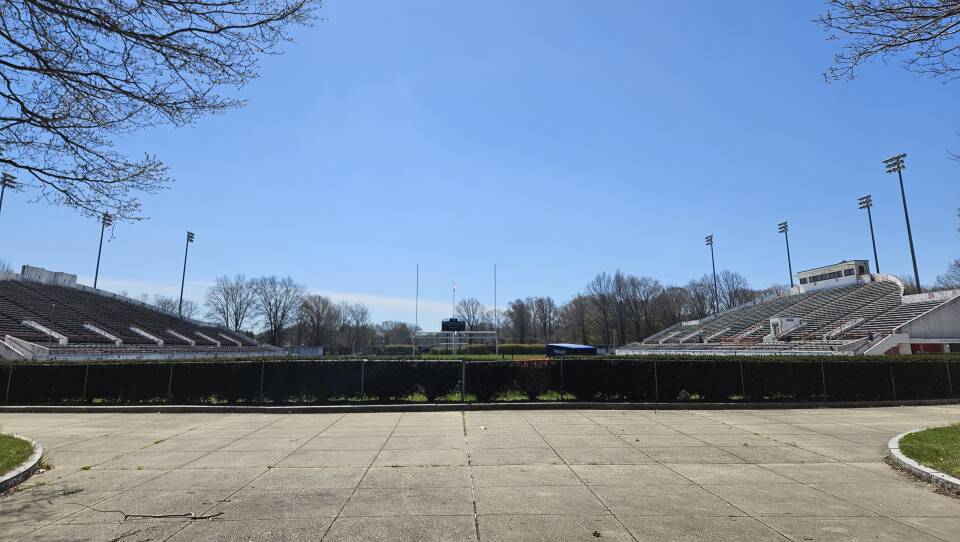Boston Mayor Michelle Wu announced on Monday that the city has come to a lease agreement with Boston Unity Soccer Partners, the group bringing a National Women’s Soccer League team to Boston, on White Stadium.
The agreement allows for construction to begin on the project that, when completed, will allow White Stadium to be utilized as a home pitch for the team currently known as BOS Nation FC. Construction is expected to begin in January.
Under the agreement, the group would split construction costs with the city and pay $200,000 to lease the field for its first season, though that number will increase. The deal also sets parameters about when and how the stadium will be used.
But the project is not without controversy, with high costs and a lawsuit from some local residents opposed to the project making the journey to this point anything but smooth. That lawsuit is set to go to trial in March.
Still, Wu was excited about the agreement when speaking to the press on Monday.
“This renovation project and ongoing lease arrangement will make White Stadium the anchor for citywide youth sports access, revitalize community programming, deliver needed ongoing investments into our beloved, historic Franklin Park, all while creating a home for the city of champions’ newest professional team,” Wu said.
Under the terms of the agreement, which is initially set for 10 years but has the option to extend, BUSP will pay for over half the construction costs and will be responsible for the work on the West Grandstand, public restrooms, spaces for the NWSL team, scoreboard, stadium lighting, technology system and the Grove area. BUSP will also be responsible for operations and maintenance for the NWSL team spaces and for shared areas, including the field and track. The city will take care of construction on the East Grandstand, BPS athletic spaces, the field and the track. Currently, the city’s portion of the cost is estimated to be $91 million.
BUSP will pay $200,000 in annualized first season payment, prorated for the number of months the entire facility is operational. The goal is to get the field and track ready for use by March 2026, Wu said the city’s side of the project is aiming for completion by December 2026, which would be after the team’s first season has ended. Starting with the second season, the rent will be $400,000 a year, escalating by 3% each following year.
BUSP is currently looking into alternatives if White Stadium isn’t ready for play in 2026.
“We are working on an alternate site, should we need it, if we are not ready to launch in the beginning of the season,” said BUSP controlling partner Jennifer Epstein.
The city will also get 10% of in-stadium advertising revenues, 10% of field naming rights revenue and 3% of concessions revenue.
Epstein said the naming rights for the field is already drawing interest, though she didn’t disclose from where exactly. Wu made sure to point out that those rights are for the field itself, not White Stadium.
BUSP will also contribute $500,000 in the first year to local organization and initiatives, an amount set to increase by 3% each year. Also, $1 from each NWSL ticket will go to a Franklin Park Preservation Fund.
BUSP is also planning to offer scholarships, internships and mentorship from the NWSL team to BPS students.
The agreement also dictates that NWSL usage of White Stadium will be limited to no more than 20 games a year, including playoffs, and one team practice in the week ahead of each game. NWSL games will also not be allowed to take place on more than two weekends in a four-week period and no more than four weekend games per season can start before 5 p.m.
Next year a White Stadium Neighborhood Council will launch that will give feedback to the city, BPS, the Parks Department and BUSP on stadium usage.
The announcement also noted that a Transportation Access Plan Agreement will be signed after construction documents are finished. Since parking at the stadium will be very limited, the game day transportation plan includes the use of electric shuttles from nearby Red and Orange line stations and from satellite parking lots. The city will also be implementing a resident parking system to attempt to cut down on congestion in nearby neighborhoods on game days.
Several members of the community spoke in favor of where the project stands as part of the announcement.
“[The Franklin Park Coalition] is pleased with the project’s progress, but our advocacy on behalf of park users will continue,” said Rickie Thompson, president of the Franklin Park Coalition, in a statement. “We will push for comprehensive traffic management for all large events (including BPS activities) to prevent increased motor traffic in and around the park. We will press BUSP to meet their 50% commitment to hire minority businesses, contractors and employees, and for BPS to exceed their targets.”
Still, there are those with serious reservations, including members of the Franklin Park Defenders, the group bringing a lawsuit against the project.
“Boston residents, park users, and the BPS community deserve a more affordable public renovation of White Stadium, rather than a giveaway of precious city resources. We believe there are other ways to invest in Franklin Park and White Stadium that would receive the full support of park users, neighborhood organizations, and community leaders,” said Karen Mauney-Brodek, president of the Emerald Necklace Conservancy and member of the group.





